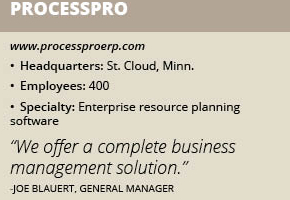
ProcessPro
The needs of batch process manufacturers in regulated environments differ greatly from those of producers in other manufacturing industries.
“A typical discrete manufacturing scenario involves having ‘x’-number of steel plates and ‘x’-number of bolts, assembling them, and then serializing every nut and bolt in the finished piece,” says Joe Blauert, general manager for enterprise resource planning (ERP) software developer ProcessPro.
“Contrarily, if you’re a salsa manufacturer making a base batch of 1,000 gallons, there are multiple lots of raw ingredients such as tomatoes and peppers mixed in a vat,” he notes. “When you’re done with a base batch, it’s common for manufacturers to divide the batch into 100 gallons to make hot salsa, and 100 gallons for sweet salsa. An additional 400 gallons could then become private label, which creates different SKUs and product names.”
In addition, if a tomato contamination were to occur, the manufacturer would need to locate which lot(s) of tomatoes were used and recall all finished goods from the tainted batch. “Food manufacturers need the ability to track inventory and lot data to generate a report that matches each lot number to a base product number,” Blauert adds.
A One-Stop Solution
With more than 30 years’ experience in the food and beverage, chemical, pharmaceutical, nutraceutical, cosmetic and cannabis industries, ProcessPro’s ERP solution has supported manufacturers with managing their critical business functions (manufacturing, quality, inventory, financials, sales and reporting). The system – available as an on-premises, software-as-a-service or cloud solution – integrates all aspects of plant operation from beginning order entry through manufacturing, inventory, packaging, shipping and accounting. The company’s target customers are small to mid-market manufacturers with an average revenue of $10 million to $250 million.
The company’s industry-specific ERP solution meets the critical needs of process manufacturers by managing recipes and formulas, effectively sizing and scale batches, tracking lot information, optimizing resource planning, providing access to real-time inventory and financial information, and regulating quality control processes. The system also assists with compliance of FDA, cGMP, GHS, SDS, labeling and other governing bodies. Available add-on applications to the system, which can be customized to each customer’s unique needs, include warehouse management, dock scheduling, direct store delivery, and research and development solutions. The solution’s analytics package enables mobile reporting, interactive visualization, reporting and analysis of data providing dashboarding, graphing, sorting and drilling into critical business information.
“We offer a complete business management solution,” Blauert says. “Typically, our clients were previously utilizing QuickBooks for accounting with a bolt-on application for inventory and Excel for maintaining recipes, formulas, and to record lot numbers. This provides a troublesome position if an FDA auditor visits your plant and provides you an hour to deliver a lot traceability report, you can’t do that in a multi-system environment. Our solution allows you to meet these demands in minutes.”
ProcessPro’s inventory control capabilities help companies to optimize efficiency and productivity at all levels of inventory operations, ensuring order guidelines and safety stock levels are met. The ERP can also assist manufacturers with segregating ingredients during the manufacturing process, including tracking specific ingredients that require specialized labeling for allergens or hazards.
“We are focused on building both partnerships with our clients as well as expertise in the ERP marketplace. This focus drives us to excel in delivering comprehensive ERP solutions and continuing to advance our products to meet process manufacturers’ changing needs,” Blauert says.
 Improved Operations
Improved Operations
Lawler Foods Ltd., implemented ProcessPro’s ERP solution in October 2011. Previously, the company utilized another ERP system for over a decade. The company was unable to use that system’s material requirements planning (MRP) function, which made Lawler Foods manually schedule its plant’s purchasing and production processes.
In addition, the family-owned dessert manufacturer was using warehouse scanning and a standalone accounting program that were third-party add-ons to its previous ERP system. Lawler Foods received little support for either system and saw a decline in their accounting productivity in particular, ProcessPro stated.
Using ProcessPro’s MRP, the company was able to save labor costs and maintain lean amounts of raw materials on-hand. The ERP system also increased the company’s inventory accuracy and minimized its shipping errors and returns. With the ability to better utilize its warehouse space, Lawler Foods has improved its overall logistics and distribution operations, ProcessPro adds.
ProcessPro’s integrated accounting functionality, which includes a complete billing and accounts receivable system as well as accounts payable capabilities, has helped Lawler Foods effectively manage business expenses. ProcessPro’s order entry feature allows the manufacturer to generate, schedule and maintain sales orders and sales order backlogs in one simple screen navigation.
Lawler Foods continues to use ProcessPro’s ERP solution to manage its recipes and streamline its business and manufacturing processes. The company also plans to utilize the solution’s dock scheduling application to manage inbound and outbound shipments, ProcessPro notes.
Programming Success
ProcessPro traces its roots back to the mid-1980s, when founder Ward Blaschko began programming custom software from his dorm room in St. Cloud, Minn. Working with several local companies prompted him to start the company soon after graduating college.
ProcessPro began focusing on the food and beverage market, which was the company’s largest client base. Over time, the company expanded into other batch process manufacturing industries, including pharmaceutical, dietary supplement, cosmetic, chemical and cannabis.
“Manufacturers in these industries have the same core challenges of how to build and manage complex business and manufacturing processes in highly regulated environments,” Blauert says. “We develop ERP solutions that can meet the needs of more than one vertical market while staying true to the essential requirements of process manufacturers.”
In 2016, ProcessPro was acquired by Open Systems, Inc., a leading business management software provider. ProcessPro operates as a division within Open Systems, Blauert notes.
Joining Open Systems has allowed ProcessPro to expand its presence outside of North America and Canada. Since the acquisition, ProcessPro now leverages a larger knowledge base including 400 staff and resources with an expanded development team.
“Many of our customers were operating exclusively within the United States,” Blauert says. “We had minimal presence in Canada and Mexico, but we previously weren’t large enough to tackle a multinational or intercontinental company’s requirements. We are now positioned to access new markets with a presence in South America, Europe and Australia, already established through our parent company.”
Going Global
With the support of its corporate parent, ProcessPro released the next generation of its ERP platform in September of 2017. ProcessPro Global retains the functionality of ProcessPro’s existing broad functional capabilities, while adding multi-lingual, multi-currency and multi-company capabilities. “This allows employees with various language preferences to easily operate in one system,” Blauert says.
ProcessPro Global is built on the Microsoft technologies of .NET, SOA and SQL Server, designed for adaptability and the ability to modify portions of the platform to meet a client’s unique business needs while allowing for seamless incorporation of future Global updates to their system, without penalty. This is unique in the ERP marketplace, the company says.
The ProcessPro Global platform also includes additional applications including customer relationship management, electronic data interchange, point of sale credit card processing and nutritional labeling. “This system provides our customers with an enhanced set of functionality to meet their needs now and in the future,” Blauert says.